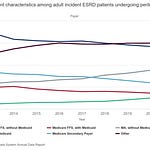Today’s guest
Eugene Lin is a nephrologist and health economics researcher who focuses on the impact of public policy and federal regulation on kidney care, the provision of dialysis in public and private insurance markets, and transitions of care for patients with kidney disease. He currently serves as an Assistant Professor of Medicine at the University of Southern California (USC). Eugene's research has been featured in high-impact publications such as JAMA, JAMA Internal Medicine, and Health Affairs. His expertise lies in analyzing how value-based care models impact the delivery of kidney care and patient outcomes, making him a key voice in the conversation about healthcare reform.
Summary
This is part two of our conversation with Dr. Eugene Lin, a nephrologist and health economics researcher, to explore the concept of value-based care. This part explores the importance of value-based care in addressing the fragmentation of care and the need for a holistic, longitudinal approach to patient care. We discuss the shift from episodic to chronic care, the accountability of healthcare providers (or lack thereof) for patient outcomes, and the necessity of simplifying metrics to align with patient needs and desires. Go to Part 01: Defining VB Kidney Care
Keywords
value-based care, healthcare system, patient outcomes, holistic care, chronic diseases, accountability, healthcare metrics, nephrology, quality measures, healthcare costs
Chapters
(00:20) The Fragmented Healthcare System
(01:13) The Disconnect Between Healthcare Spending and Health Outcomes
(02:30) Balancing Cost Savings and Patient Health
(05:32) Addressing the Rise of Chronic Diseases
(08:33) Patient-Centered Goals in Value-Based Care
Takeaways
Value-Based Care Aligns Costs and Outcomes: Value-based care aims to reduce unnecessary healthcare costs while improving patient outcomes, particularly by preventing complications like rehospitalizations after surgeries. However, it's important to ensure that cost-saving measures don’t result in withholding necessary care, which can negatively impact patients.
Holistic Care for Chronic Diseases: With the rise of chronic conditions requiring long-term management, value-based care encourages a shift toward more holistic, coordinated care. This means focusing not just on treating isolated conditions but managing the entire patient’s health and well-being across multiple specialties.
The Role of Nephrologists in Holistic Care: Nephrologists are increasingly held accountable for the overall cost of care, not just kidney-related treatments. This shift incentivizes them to consider comorbidities like cardiovascular disease and diabetes, encouraging a more comprehensive approach to patient management.
Challenges in Defining and Measuring Outcomes: One of the barriers to wider adoption of value-based care is determining whose outcomes to prioritize and how to measure them effectively. There’s a need for more collaboration in defining metrics that align with both provider capabilities and patient goals.
Complex Metrics Can Create Confusion: Value-based care models should avoid overly complex metrics that confuse both providers and patients. When the goals are clear and simple—such as keeping patients out of the hospital and maintaining daily activities—it aligns better with what patients want from their care.
Discussion Topics
How can value-based care models balance cost-saving measures with ensuring necessary care for patients?
What are the advantages of a holistic approach to managing chronic diseases under value-based care?
How do you think nephrologists and other specialists can collaborate more effectively in a value-based care environment?
What challenges do you see in defining and measuring outcomes that align with both patient goals and healthcare provider capabilities?
How can value-based care models be simplified to ensure that both providers and patients clearly understand the goals and metrics?
![Signals From [Space]](https://substackcdn.com/image/fetch/w_80,h_80,c_fill,f_auto,q_auto:good,fl_progressive:steep,g_auto/https%3A%2F%2Fsubstack-post-media.s3.amazonaws.com%2Fpublic%2Fimages%2F55686857-6b99-45a6-ac0f-09c9f023f2a0_500x500.png)
![Signals From [Space]](https://substackcdn.com/image/fetch/e_trim:10:white/e_trim:10:transparent/h_72,c_limit,f_auto,q_auto:good,fl_progressive:steep/https%3A%2F%2Fsubstack-post-media.s3.amazonaws.com%2Fpublic%2Fimages%2F4d588ac1-7fac-4bd4-829d-fc7b4e8f1326_1512x288.png)

![Signals From [Space]](https://substackcdn.com/image/fetch/w_36,h_36,c_fill,f_auto,q_auto:good,fl_progressive:steep,g_auto/https%3A%2F%2Fsubstack-post-media.s3.amazonaws.com%2Fpublic%2Fimages%2F55686857-6b99-45a6-ac0f-09c9f023f2a0_500x500.png)














Share this post